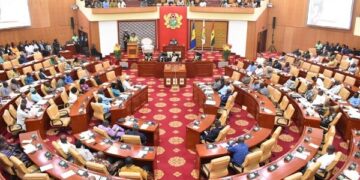Member of Parliament for Klottey Korle, Dr. Zanetor Agyeman-Rawlings, has lamented that the devastating impact of illegal mining, commonly known as galamsey, has plunged Ghana into “chemical warfare on an unprecedented scale.”
She voiced grave concerns about the disastrous consequences galamsey is having on Ghana’s natural resources, public health, and governance.
“I am haunted by the horrifying images of our water bodies and forests ravaged by galamsey,” Dr. Agyeman-Rawlings wrote in a compelling LinkedIn post, underscoring the ecological and health crisis caused by illegal mining across the nation.
She emphasized that the visible destruction is only a small part of a much larger problem.
She suggested that if the Ghana Standards Authority (GSA) were to test the country’s water bodies, both surface and underground, the nation might finally grasp the full extent of the damage. “That includes borehole water!” she added, stressing the widespread contamination and its far-reaching impact on all Ghanaians.
Dr. Agyeman-Rawlings described the situation as “outright chemical warfare on an unprecedented scale,” lamenting the magnitude of destruction in a peaceful, democratic nation. “It is shameful, actually,” she noted.
Touching on the public health crisis, she warned of alarming increases in kidney failure, cancers, infant mortality, birth defects, and water shortages, all linked to galamsey.
“Are we waiting for famine in the midst of poisoned plenty before we realize the urgency,” she questioned.
Her fear is that action will only come when it is too late—when lives have already been lost. She pointed to greed and corruption as the root causes of the problem. “The galamsey feeding the insatiable greed of some is being sustained by corruption,” she said, criticizing the failure of the state to take firm action.
“Once again, corruption and the lack of accountability are threatening our very existence,” she stressed, delivering a sharp critique of the government’s response.
She questioned the effectiveness of the executive and law enforcement in tackling the crisis. “Of what use are all the powers vested in the executive branch if not for a time such as this?” she asked.
Dr. Agyeman-Rawlings cautioned that continued inaction could lead to a loss of faith in the state, creating a vacuum that might give rise to vigilantes taking justice into their own hands. She labelled galamsey not just an environmental disaster but a “national security threat that has escalated into a full-blown crisis.”
In a fervent call for immediate action, she urged the government not to use this crisis as political fodder. “This is not a populist propaganda tool for votes,” she exclaimed.
“For once, the right thing must be done in the interest of the present and future of the people and the country we love so much,” she stressed




















































































